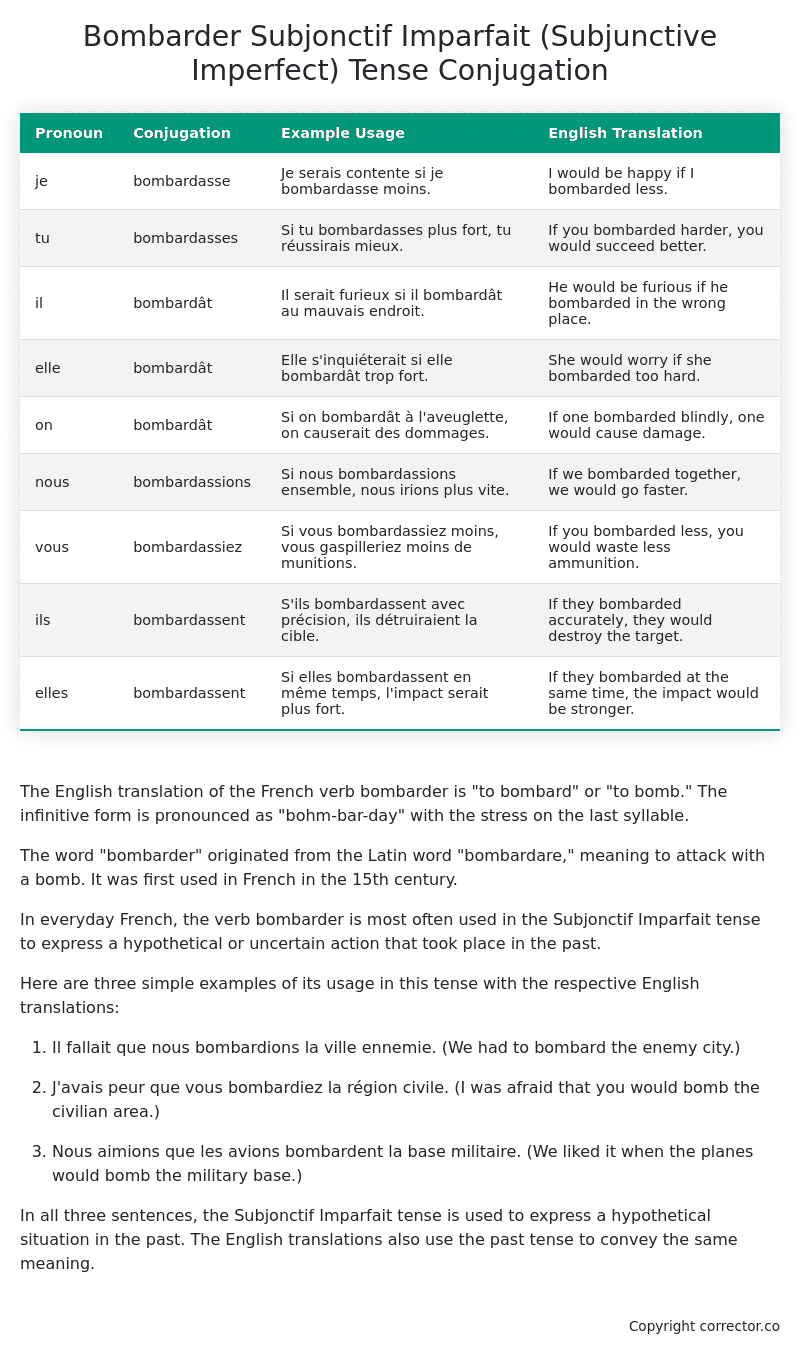Subjonctif Imparfait (Subjunctive Imperfect) Tense Conjugation of the French Verb bombarder
Introduction to the verb bombarder
The English translation of the French verb bombarder is “to bombard” or “to bomb.” The infinitive form is pronounced as “bohm-bar-day” with the stress on the last syllable.
The word “bombarder” originated from the Latin word “bombardare,” meaning to attack with a bomb. It was first used in French in the 15th century.
In everyday French, the verb bombarder is most often used in the Subjonctif Imparfait tense to express a hypothetical or uncertain action that took place in the past.
Here are three simple examples of its usage in this tense with the respective English translations:
-
Il fallait que nous bombardions la ville ennemie. (We had to bombard the enemy city.)
-
J’avais peur que vous bombardiez la région civile. (I was afraid that you would bomb the civilian area.)
-
Nous aimions que les avions bombardent la base militaire. (We liked it when the planes would bomb the military base.)
In all three sentences, the Subjonctif Imparfait tense is used to express a hypothetical situation in the past. The English translations also use the past tense to convey the same meaning.
Table of the Subjonctif Imparfait (Subjunctive Imperfect) Tense Conjugation of bombarder
| Pronoun | Conjugation | Example Usage | English Translation |
|---|---|---|---|
| je | bombardasse | Je serais contente si je bombardasse moins. | I would be happy if I bombarded less. |
| tu | bombardasses | Si tu bombardasses plus fort, tu réussirais mieux. | If you bombarded harder, you would succeed better. |
| il | bombardât | Il serait furieux si il bombardât au mauvais endroit. | He would be furious if he bombarded in the wrong place. |
| elle | bombardât | Elle s’inquiéterait si elle bombardât trop fort. | She would worry if she bombarded too hard. |
| on | bombardât | Si on bombardât à l’aveuglette, on causerait des dommages. | If one bombarded blindly, one would cause damage. |
| nous | bombardassions | Si nous bombardassions ensemble, nous irions plus vite. | If we bombarded together, we would go faster. |
| vous | bombardassiez | Si vous bombardassiez moins, vous gaspilleriez moins de munitions. | If you bombarded less, you would waste less ammunition. |
| ils | bombardassent | S’ils bombardassent avec précision, ils détruiraient la cible. | If they bombarded accurately, they would destroy the target. |
| elles | bombardassent | Si elles bombardassent en même temps, l’impact serait plus fort. | If they bombarded at the same time, the impact would be stronger. |
Other Conjugations for Bombarder.
Le Present (Present Tense) Conjugation of the French Verb bombarder
Imparfait (Imperfect) Tense Conjugation of the French Verb bombarder
Passé Simple (Simple Past) Tense Conjugation of the French Verb bombarder
Passé Composé (Present Perfect) Tense Conjugation of the French Verb bombarder
Futur Simple (Simple Future) Tense Conjugation of the French Verb bombarder
Futur Proche (Near Future) Tense Conjugation of the French Verb bombarder
Plus-que-parfait (Pluperfect) Tense Conjugation of the French Verb bombarder
Passé Antérieur (Past Anterior) Tense Conjugation of the French Verb bombarder
Futur Antérieur (Future Anterior) Tense Conjugation of the French Verb bombarder
Subjonctif Présent (Subjunctive Present) Tense Conjugation of the French Verb bombarder
Subjonctif Passé (Subjunctive Past) Tense Conjugation of the French Verb bombarder
Subjonctif Imparfait (Subjunctive Imperfect) Tense Conjugation of the French Verb bombarder (this article)
Subjonctif Plus-que-parfait (Subjunctive Pluperfect) Tense Conjugation of the French Verb bombarder
Conditionnel Présent (Conditional Present) Tense Conjugation of the French Verb bombarder
Conditionnel Passé (Conditional Past) Tense Conjugation of the French Verb bombarder
L’impératif Présent (Imperative Present) Tense Conjugation of the French Verb bombarder
L’infinitif Présent (Infinitive Present) Tense Conjugation of the French Verb bombarder
Struggling with French verbs or the language in general? Why not use our free French Grammar Checker – no registration required!
Get a FREE Download Study Sheet of this Conjugation 🔥
Simply right click the image below, click “save image” and get your free reference for the bombarder Subjonctif Imparfait tense conjugation!

Bombarder – About the French Subjonctif Imparfait (Subjunctive Imperfect) Tense
Formation
Common Everyday Usage Patterns
Interactions with Other Tenses
Subjonctif Présent
Indicatif Passé Composé
Conditional
Conditional Perfect
Summary
I hope you enjoyed this article on the verb bombarder. Still in a learning mood? Check out another TOTALLY random French verb conjugation!


